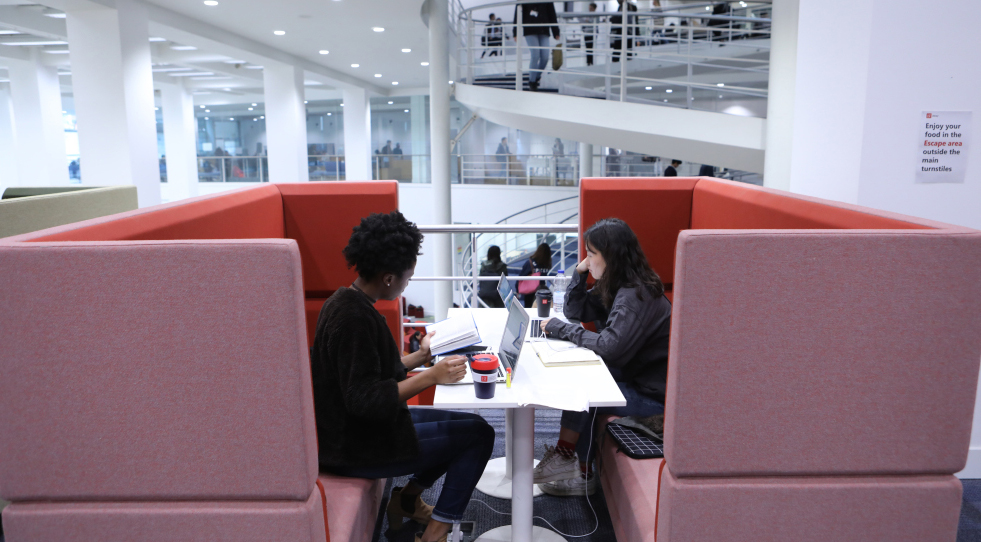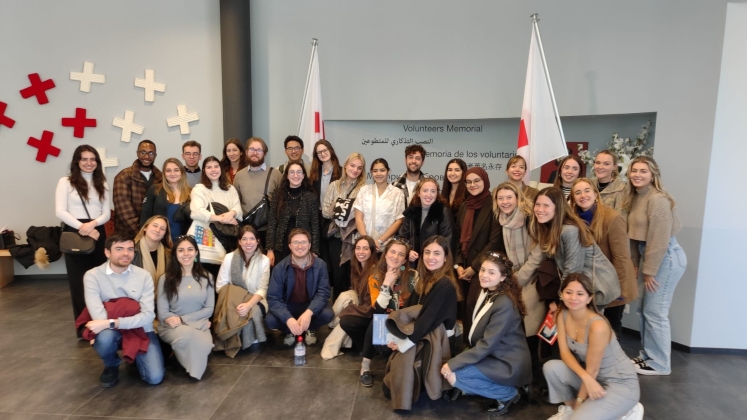On the 18th of November, a coach of MSc Health and International Development Students arrived at Cumberland Lodge to embark on a weekend of seminars, group activities, and the opportunity to escape London and stay in the beautiful setting of a 17th Century, Grade II listed country house in Windsor Park. Kassandra Jones gives an account of the weekend.
Image credit: Kassandra Jones
Attending a masters program in London has been an absolute blessing, but as someone who attended university by the beach, I often feel overwhelmed by the amount of movement and people I experience on a daily basis. So, when I was told about an opportunity to leave the city and combine my personal interest in travel, history, and nature with my academic interest in communicable diseases, I jumped at the chance.
If you have ever seen the movie Pride and Prejudice then you already understand the feel of Cumberland Lodge. It is an old country home located near Windsor Castle that now serves as a foundation that hosts conferences and lectures. Driving up on a Friday afternoon was an adventure in itself, watching the industrial views of the city slowly dissipate into the luscious greenery of the countryside with the setting sun.
Our first lecture of the weekend was on the Ebola epidemic in Sierra Leone by Emma Ross, a senior fellow at Chatham House. Ross discussed the Ebola epidemic from the British perspective, focusing on how the British military responded on the ground with the Sierra Leone government. The general theme of the lecture was not on the disease itself or even the health sector response but on the tension both between the governments and within the Sierra Leone government. As someone with a STEM background this can be extremely frustrating but it is the reality; healthcare, especially disease control and response, is just as political as it is biomedical.
The next morning started early, as I wanted to take advantage of any free time I had to explore the grounds. The views did not disappoint. Landscapes of thick trees, green grass, and the pale purple and orange sky surrounded me. At one point, I stopped to stare out into the misty countryside half expecting Mr. Darcy to come walking towards me (Did I make Pride and Prejudice references the entire weekend? Absolutely). With wet shoes and amazing pictures, I ran back to have a proper English breakfast before starting the day.
What was on the schedule? Talks from an anthropologist and a former Surgeon General and a deer stalking adventure (Yes, you read that correctly). The two talks were an interesting juxtaposition. Jonah Lipton, an anthropologist and post-doctoral researcher, discussed his Ph.D. research in Sierra Leone before and during the epidemic. His lecture provided an often crucial missing viewpoint of what it’s like to actually be living on the ground as a local during an epidemic. Louis Lilywhite, former Surgeon General, talked from an almost opposite perspective, discussing International Health Regulations and the international response to the epidemic. What I was personally able to draw from their talks together was the lack of health sector capacity building on the local level and the lack of planning and preparedness on the international level.
With that said, it was time for a much needed break outdoors. And what would you know, LSE has its own resident deer expert Stuart Gordon, the IDHE program director, who took us to see the largest single group of deer I have ever seen. But what was more enjoyable was the bonding experience between students enjoying the sun outside after what seemed to be weeks of non-stop rain and clouds in London.
The bonding continued back at the Lodge through an eye-opening simulation activity and an even more eye-opening student-run Pub Quiz Night where students were put to the test on their knowledge of pop-culture, science, and, yes, even their program readings.
The next day, we had our final talk on the epidemic by Laura Sochas, LSE Ph.D. candidate in Social Policy, who gave an important lecture on what deaths count during an epidemic. Do we only count the people who die from the disease directly or do we include the people who are unable to receive proper healthcare because health resources have been diverted specifically to this one disease? Her talk outlined the importance of considering the unintended consequences of outbreak response when planning/executing a proper health response.
But all too soon we were on the road again, back to the hustle and bustle of the London streets and the rigour of our beloved masters program. Weeks later, I am still reflecting on my experience during the information-packed weekend. In the field of International Development, it is easy to become disheartened at the sheer amount of work that needs to be accomplished on multiple different levels. But Cumberland Lodge showed me that at least we have a great number of people willing to learn and work towards the common goal of decreasing human suffering. And that has to count for something.
Kassandra Jones is an MSc Health and International Development student in the LSE International Development department. She holds a B.S. in Biomedical Sciences with minors in Physics and Medical Anthropology and has recently served in the Americorps as a Health Communication and Clinic Coordinator VISTA.
The views expressed in this post are those of the author and in no way reflect those of the International Development LSE blog or the London School of Economics and Political Science.





